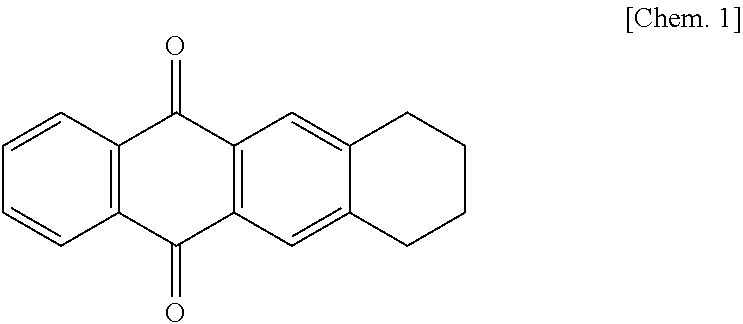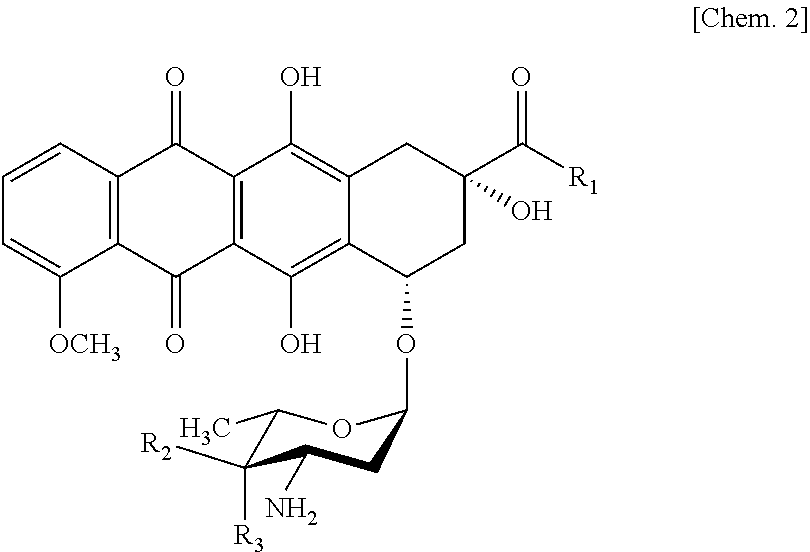Ketoreductase mutant
a ketoreductase and mutant technology, applied in the field of ketoreductase mutants, can solve the problems of low yield, low production cost, and only approximately 54 g/ml, and achieve the effect of improving the productivity of a daunorubicin derivativ
- Summary
- Abstract
- Description
- Claims
- Application Information
AI Technical Summary
Benefits of technology
Problems solved by technology
Method used
Image
Examples
example 1
[0036]Introduction of mutations into ketoreductase gene (evaE) from chlororemomycin-producing bacterium (Amycolatopsis orientalis)
[0037]Plasmid pIJ4070 [Bibb, M. J. et al., Gene, (United Kingdom), 1985, vol. 38, p 215-226 (non-patent literature 7)] comprising an ermE* promoter was double-digested with EcoRI and BamHI, and fractionated by electrophoresis, and an EcoRI-BamHI fragment of approximately 0.3 kbp comprising the ermE* promoter was extracted from the gel. This DNA fragment was inserted between the EcoRI and BamHI sites of plasmid pSET152 to obtain plasmid pSET152-E*.
[0038]With respect to a ketoreductase gene (evaE) from a chlororemomycin-producing bacterium (Amycolatopsis orientalis), a BamHI-XbaI fragment consisting of the nucleotide sequence of SEQ ID NO: 2, of which the full sequence was chemically synthesized, was inserted between the BamHI and XbaI sites of plasmid pSET152-E* to obtain plasmid pEVA-E. Random mutations were introduced into the evaE fragment, using plasmi...
example 2
Introduction of Saturation Mutations into Plasmid pEVA-E
[0045]A PCR was carried out, using plasmid pEVA-E constructed in Example 1 as the template, the following primer sets, and a PrimeSTAR HS DNA polymerase (manufactured by Takara Bio Inc.), by repeating a cycle consisting of a reaction at 98° C. for 10 seconds and a reaction at 68° C. for 7 minutes 25 times. The capital letters in the following primer nucleotide sequences represent portions into which saturation mutations are introduced.
[1] NAC-F(SEQ ID NO: 5)5′-gcggaacagatcctcaagNACgccacggcaaatggccag-3′NAC-R(SEQ ID NO: 6)5′-ctggccatttgccgtggcGTNcttgaggatctgttccgc-3′[2] NCC-F(SEQ ID NO: 7)5′-gcggaacagatcctcaagNCCgccacggcaaatggccag-3′NCC-R(SEQ ID NO: 8)5′-ctggccatttgccgtggcGGNcttgaggatctgttccgc-3′[3] NGC-F(SEQ ID NO: 9)5′-gcggaacagatcctcaagNGCgccacggcaaatggccag-3′NGC-R(SEQ ID NO: 10)5′-ctggccatttgccgtggcGCNcttgaggatctgttccgc-3′[4] NTC-F(SEQ ID NO: 11)5′-gcggaacagatcctcaagNTCgccacggcaaatggccag-3′NTC-R(SEQ ID NO: 12)5′-ctggccatttgcc...
example 3
Construction and Evaluation of Double Mutation of K153T and Q149S
[0051]Genomic DNA from the clone which was isolated in Example 1 and which had the highest productivity and the amino acid substitution of K153T was subjected to a PCR, using a combination of primer pSET153-R (SEQ ID NO: 3) and primer pSETermE-R (SEQ ID NO: 4), together with a PrimeSTAR HS DNA Polymerase (manufactured by Takara Bio Inc.), under the following cycle conditions:[0052]a cycle consisting of a reaction at 98° C. for 10 seconds, a reaction at 60° C. for 5 seconds, and a reaction at 72° C. for 1 minute was repeated 25 times.
[0053]As a result, an amplified fragment of approximately 1 kbp was obtained. This amplified fragment was double-digested with BamHI and XbaI, and inserted between the BamHI and XbaI sites of plasmid pSET152-E* to obtain plasmid pEVA-E-1 containing evaE with the amino acid substitution of K153T. This plasmid pEVA-E-1 was subjected to a PCR, using a combination of primer pSET153-R (SEQ ID NO...
PUM
| Property | Measurement | Unit |
|---|---|---|
| temperatures | aaaaa | aaaaa |
| temperatures | aaaaa | aaaaa |
| three-dimensional structures | aaaaa | aaaaa |
Abstract
Description
Claims
Application Information
 Login to View More
Login to View More - R&D
- Intellectual Property
- Life Sciences
- Materials
- Tech Scout
- Unparalleled Data Quality
- Higher Quality Content
- 60% Fewer Hallucinations
Browse by: Latest US Patents, China's latest patents, Technical Efficacy Thesaurus, Application Domain, Technology Topic, Popular Technical Reports.
© 2025 PatSnap. All rights reserved.Legal|Privacy policy|Modern Slavery Act Transparency Statement|Sitemap|About US| Contact US: help@patsnap.com


